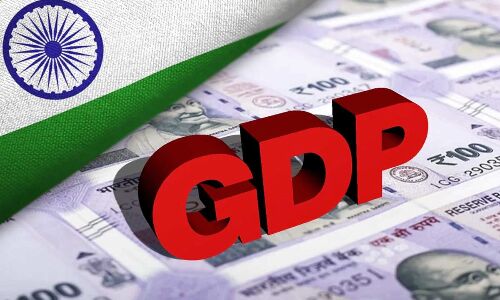Despite geopolitical risks, ICRA pegs India’s Q1 growth at 13%Despite geopolitical risks, ICRA pegs India’s Q1 growth at 13%Even as news of the economy is getting more somber, investment and credit rating agency ICRA has projected that the first quarter of the current fiscal is likely to show 12 to 13 per cent growth. It makes this upbeat assessment even as wholesale price inflation has shot up to 15 per cent and the rupee is depreciating to record lows. It is joined in its more positive outlook by the central bank which has termed the Indian economy’s recovery as remaining ‘resilient’ despite global headwinds. ICRA has based its forecast for the first quarter (April to June 2022) on its business activity index showing the second highest reading for the past 13 months. The agency’s business activity monitor at 115.7 was roughly 16 per cent higher than a year ago or pre-Covid levels. The situation is expected to persist in May, leading to an overall growth of up to 12 to 13 per cent. But annual growth, it has noted, may moderate to about 7.2 per cent. ICRA which is a joint venture between Moody’s and some Indian commercial banks and financial service companies has pegged inflation to range in the region of 6 to 6.5 per cent during the year. The main worries are rising fuel prices and the impact of the conflict in Ukraine. What is significant about the agency’s assessment is that it indicates that business operations have been going ahead rather rapidly even though geopolitical developments have cast a pall over the economic outlook for the year. It is not just the war in Ukraine, but other factors like the Covid-related movement curbs in China and the tightening money supply policy of the US Federal Reserve is also affecting normal trade and industry. As far as the war is concerned, the biggest impact has been on global oil markets which have been hardening consistently over the past few months. The benchmark Brent crude prices are hovering in the region of 100 dollars per barrel. This is significantly lower than the dire predictions made earlier that these would cross 130 dollars per barrel after the conflict began in the Ukraine. But it is still far higher than the budgetary assumptions of 70 to 80 dollars per barrel made by policymakers in this country. The soaring crude oil prices have translated into enhanced retail prices for petrol, diesel and LPG. This in turn has had a cascading effect on prices as any hike in diesel prices impacts transport of all commodities. The pass-through effect of fuel price increases has led to headline inflation reaching as high as 7.8 per cent in April. The central bank reacted by shifting its focus from growth to inflation and raising interest rates for the first time in four years. Fuel is not the only area where prices have risen beyond expectations owing to the conflict in Europe. Food prices have also shot up with edible oils leading the way owing to shortages in global availability. Rising wheat prices have pushed the government to restrict exports though this could affect farmers’ incomes in the short run. Sunflower oil supplies from the Ukraine have been curtailed and the situation has worsened with Indonesia imposing an embargo on sales. Manufacturers are also facing shortages of critical raw materials and components due to global supply chain disruptions. These have pushed up prices of several products including semi-conductors. The net result has been lower output of many industrial products including automobiles despite the robust demand. Another export-oriented industry now facing problems is the gem and jewellery sector. It is facing difficulties in procuring rough diamonds which are largely sourced from Russia. On the positive side, however, prices of some raw materials like aluminium and iron ore have declined in world markets. Even some precious metals like palladium are no longer ruling at record levels as was the case immediately after the Ukraine conflict began. At the same time, the problem of Covid-related curbs in China is also affecting global supply chains. Availability of components from that country has faced disruption, affecting industries here. Yet another factor affecting the economy right now is the tightening money policy of the US Federal Reserve that has led to foreign institutional investors withdrawing funds from stock markets here. Though this has created volatility, fortunately markets had factored in this development several months ago. Even rupee depreciation is not causing as much concern as in the past owing to the country’s comfortable foreign exchange reserves. These are in the region of 600 billion dollars, covering about ten months worth of imports. ICRA’s assessment is significant in this context as it notes that despite all the numerous geopolitical factors, business activity remained at a relatively high level in April with momentum set to continue in May. It reflects the fact that trade and industry has been on a revival path over the past few months. The question is, will this revival of business activity continue apace during the rest of the current fiscal. Much will depend on whether inflationary pressures can be contained even as the central bank has begun to play its role by raising interest rates. The government, on its part, would do well to cut excise duties on oil products as a way of reducing the impact of high fuel prices on the economy. This is feasible right now as revenue collections are buoyant both in terms of direct and indirect taxes. It has to be conceded, of course, that inflation is a global phenomenon right now and India is bound to be caught in the same turmoil as the rest of the world. Yet cutting taxes on oil products remains a viable option and it is high time for the government to take this bold step which could be a game changer in containing inflationary pressures on the economy.
From: thehansindia
URL: https://www.thehansindia.com/business/despite-geopolitical-risks-icra-pegs-indias-q1-growth-at-13-744084



